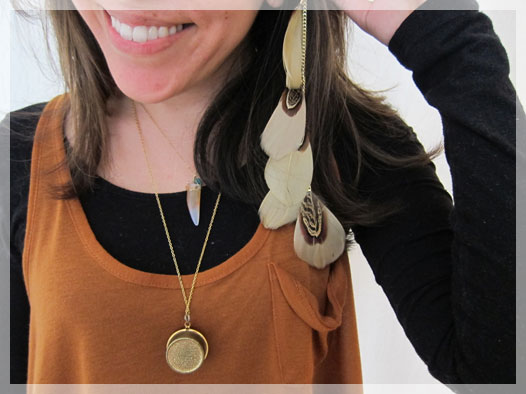I thought I was doing really well. I’ve been good about eating super healthy (still mainly gluten free and all vegan) and shopping at local shops for food. I’m trying to learn how to meditate and incorporate more yoga throughout the week. Matt and I have cut down our T.V. watching and actually sit around the table for dinner and talk. We eat sprouted mung beans and organic carrots when we can afford it. I was feeling all very back-patty.
And then.
I got this comment from some anonymous person in the previous post (Weekend Wear for Cold Climates):
http://www.guardian.co.uk/business/2008/jun/23/primark.children
Just a little link that I originally ignored because I thought it was spam (ahem, Anonymous) and because I didn’t want to read about child labor and slums (such a downer for a Saturday night — feel free to cringe). I assume Anonymous linked it because I mentioned I got my Regata Gala sweatshirt from Primark.
For those of you stateside, Primark is like H&M and Target had a baby and then sold that baby for cheaper than Walmart prices. When Matt and I first wandered into Primark here in Edinburgh, our eyes lit up. We could actually afford fun, frivolous things again. What with traveling and trying to save for the future — again more back-patty action — we/I can’t really afford trips to Top Shop and Zara (£40/$63 for a blouse, no thank you!). At Primark we can buy fuzzy hot water bottles, armloads of clothes, cute necklaces, socks, scarves, pillows and belts for only £40. Heaven!
Now at the back of my mind I did have that niggly sensation (aka guilty conscience) because I knew if I was buying a necklace for £1, someone on the other end wasn’t making very much money. I’ve had the niggles when shopping at other places (Forever 21, H&M, Target, Walmart, etc.), but the sensation is never so great that I couldn’t tamp it down with. buying more cute stuff! For instance, this weekend Matt and I needed a pick-me up and we decided to just have a looksee at Primark. You can see what I bought here:
See that expression smiley with a twinge of guilt: Tank and hair feathers from Primark • Skinnies from Madewell (now I’m questioning you too, Madwell! Read here about their social responsibility) • Hunter Boots (how do you treat your rubber workers, Hunter? The only info I could find was that all Hunters used to be made in Scotland, originally Edinburgh –woohoo!– but they had to move shop overseas in 2008 due to financial pressure — bummer).
Two out of three ethically-made pieces here! June Shin necklace (jeweler based out of Atlanta, Georgia) • Snoozer Loser quarter-holder necklace (independent online boutique based out of New York) • Primark feather hair thingie (errr)
I went to upload these photos into an AsianCajun post about Edinburgh and springtime (it would have been a lot less wordy — sorry!), and that’s when I saw Anonymous’ link. Niggly turned into full on face-punch. Dang it! So I did a bit of (internet) research. It is true that since 2008, Primark has tried to stop child labor at their supplier’s factories in Bangladesh and India. But since then, very little has been done to change the terrible circumstances of a vast number of people working in the garment industry — all so I can buy a cute tank for £2.
I know other retailers are culpable, and probably the best bet for not buying something that supports subsistent living conditions for thousands is by visiting your local charity shop and thrift stores. For staples like tees and good fitting jeans and work clothes, I’m going to find companies that have invested in fair trade principles.
How about you? Do you guys have any great tips on where to shop (and not spend an arm and a leg) on ethically made clothing? Do you even care about this or does it just make you tired — another thing to do better! (I know that’s how I feel, but I really will attempt to adjust my shopping habits). Do leave comments about this! I’d love to hear tips on how to be a more conscientious consumer and if you guys struggle with this too.
Eeesh! That’s a lot for a Monday isn’t it? How ’bout some pretty crocuses to leave you feeling happy after all that serious talk:
p.s. I know this issue is much bigger and more complex than I covered in this single blog post. Please feel free to just add to the conversation in the comments below. I’ve been reading War of Want’s Love Fashion Hate Sweatshop campaign, and they suggest that you shouldn’t boycott your favorite high street stores because that means loss of jobs for those on the other end (already making too little to live on). Instead, they suggest you campaign for workers’ rights. Read more about how to do that here.
—-
Dear Kitcath,
Sorry to be so wordy lately! I really did just want to write a post about springtime in Edinburgh, and just couldn’t!
I’m looking up some good places in the UK to shop that won’t leave me with a guilty conscience. I feel like Decatur has so many great places: Mingei, Evolve Boutique, Green Mosaics, etc. I need to find the Edinburgh equivalents!
Love and Happy Monday!
Lar





I am lucky that Decatur does have so many great, ethical, places to shop at, but I’m equally as guilty of buying clothes made in some developing country where labor is cheap. I think it all just comes back down to leading a more conscientious life – which is not easy to do!
Also, we’re on I.O.U.’s (iouproject.com) mailing list and they have great products. The best part is that you can see who actually made the products on their website. The stuff isn’t cheap, but it’s not crazy either. The Chambray Grandpa shirt is my favorite!
love, cath
Thanks, Kitcath! Yeah I love the idea behind IOU! I am definitely going to try find more brands like it. Misss you!
L, have you heard of the versalette? It’s all about these issues. You should check out the video! It is such a great idea, and I hope those ladies expand their line. http://www.revolutionapparel.me/the-versalette/
E, this is sooo awesome! I hadn’t heard of them before and i just spent 15 minutes scouring their website and reading what they are all about. I’m going to sign up for their newsletter because I can’t wait to see the rest of their collection too.
p.s. Miss you!!!!
xoxoxo,
L
There’s definitely a gap in the market for eco-friendly/cruelty free/ethically produced items that aren’t hideous or astronomically priced. This is definitely a thought that lingers in my mind every time I walk into a fast fashion store. I suppose the best ways to counteract the megastores is to buy vintage or handmade, but I still haven’t found a decent solution to the basics – where can I buy a white tee or tanks for reasonable price (pref. under $10) that’s made ethically? I go through a pack of those every season, and find paying $24-$28 per shirt at American Apparel appalling. Also, Dov Charney is a fucking skeez.
Oooo totallly agree about the AA stuff and Charney – grossness personified. It is definitely the basics that get me every time too and that’s why I always end up in the high street stores. I’ll let you know if I find any good alternatives in my meanderings, Alicia!
Do you know about Awakened Aesthetic? They post about ethical fashion and beauty and home goods.
I agree with you that trying to find non-sweatshop, affordable fashion really is hard, though, and it seems like most of the time, it’s making a choice for the “least bad” option, rather than feeling like you’re wholeheartedly doing actual good. Something as simple as shoe-shopping demands a spreadsheet of natural vs. manmade materials and environmental impact, conditions under which these shoes were made (and the possibility that even a sweatshop may still be a better option in a specific situation than the alternative), where these shoes are being sold and the ethics of both the manufacturer and the company selling the shoes to you, durability of said footwear, ability to project an appropriate societal picture for the occasions in question where said shoes will be worn, basic fit and the extent to which imperfect fit can be compensated for with the more calculatedly ethical shoe, oh, and of course, ability to afford them!
. yeah, hi, I’m Little Miss Hapa McRantypants, nice to meet you. 😉
Hahaha! It’s so true thought, Lynne! Matt was asking me where I draw the line, and I really don’t know!
Thanks so much for the link to Awakened Aesthetic — that’s exactly what I was looking for!
p.s. Love your Pinterest, Lynne!
I look at a few things. Firstly, how MUCH I buy. I find I was just as happy buying less as I was buying a few new pieces every single month after the growing pains period. It seemed more responsible to me to reduce my consumption instead of just trying to buy ethically – because *everything* I buy has a footprint.
Second – as mentioned by others – I try to buy as much pre-owned stuff as possible. This is stuff that would otherwise end up in a waste stream.
The third point – finding ethically made stuff – is the tricky one. I do still buy American Apparel even though I know Dov is a scumbag and I hate hate hate him, and I wrote about that here:
http://jesseanneo.blogspot.com/2011/04/and-i-said-to-myself-ive-gotta-fight-or.html
My first value is that the item is vegan, my second ties for environmental impact and labor standards. But environmental impact itself is 50 different things – how the textiles were made, how that waste was managed, how that was transported, how the final item was made in terms of labor standards and waste management/pollution and where it was transported. The sad fact is that we barely find OUT about 1/8th of those things. Buying vegan is easy. Buying with an eye towards environmental standards and labor standards is much harder.
The other factor in all of this (in addition to amount of clothes and environmental and labor standards) is how often or how long the item will be used. A big factor in whether something is environmentally conscious or not is how long it stays with you and takes the place of another new item.
All of these points are why I do an outfit blog and look at how/why I’m buying what I buy, what works for me, what I hang on to and brands I find and like.
Hi Jesse! Thanks so much for sharing your process with us and your blog (going there in just a sec). I definitely am conscious about not buying just to buy (apart from my recent visits to Primark) and really limited what goes in and out of my closet. I can’t wait to read more about your decision making process and how you shop/or don’t shop on your blog. Sounds inspiring!
Hi Asian Cajuns! Big fan, first time commenter. Thank you for raising this topic here and for including the link to Love Fashion Hate Sweatshop. I often struggle with reading so many style blogs that assume we can all afford to wear the latest collections from celine or stella mccartney — of course, 99% of us can’t, so that leaves most of us scouring ebay or waiting for the h&m version of it. In addition to buying locally and used, I think buying less is also a place to start. I’m trying to make it through the last month of self-imposed shopping cessation, but this is not a long-term solution (and I’ll admit it is just as much for the benefit of my wallet as it is a matter of social responsibility — tangentially, it’s made me a believer that 70% of fashion comes down a question of silhouette which can usually be re-created with pieces I already own. Except for peplums — curses, peplums!)
I also wonder, like you mentioned at the end of your post, if this is a problem that can be solved through shopping (or lack thereof). Part of me thinks that if Primark, Penney’s and H&M all shut down due to buyer boycotts, that would just broaden exploitative labor markets — they would deepen in other industries, or move to areas with even looser regulations. This might sound obvious, but perhaps the most sustainable solution would be investing in women’s education and micro-lending in the countries where these stores base most of their workforce, so women have more options for work before they even walk through the factory doors.
Hi Callie!
Thanks so much for commenting (and reading AsianCajuns ;))! You and Jesse (above) make such good points about buying/shopping less which I think is a crucial aspect to all of this too: consumerism. Just as you say, seeing new unattainable (for most of us) fashion on the runway turned into attainable goods via fast cheap fashion is what keeps the wheels of exploitation turning. The more we want and the more often we want it, the harder and faster workers are made to work without any compensation in pay or days off.
And yes! I totally agree with you about investing in women’s education and self-run businesses. For the past few years I’ve donated to Women For Women International for exactly that reason. Novica.com, started by National Geographic, is another great site to visit if you want to shop and support artisans (men and women) around the world.
Thanks again for leaving such a wonderful and inspiring comment, Callie!
xoxox,
Lar
I’ve got it made since I work in a secondhand store. It kind of makes things really easy for me, and I get an employee discount on top of that. Woot woot! Seriously though, I do try to buy as much secondhand as I can for the same reasons. While I love certain brands for their style, I can’t help but question the products I am buying. I figured it’s the best of both worlds buying used clothes, and when I want to buy new I always try to hit up a local boutique and spend my money supporting my friends. My equation is hardly perfect, but for the most part it works for me.
Your equation sounds pretty darned awesome to me, Christy! Thanks for sharing it. Thinking about all of this really did make me smack myself for not taking advantage of all the second-hand shops right in my neighborhood.
Gotta admit . it just wears me out to think of ALL the things I could be doing better: diet (vegan/organic), clothes (vegan/organic), makeup (vegan/organic) 😉 But of course it’s worth the effort to make the world a better place for everyone! I’m glad you mentioned the issue about workers’ rights – though NO ONE should be working in sweatshop conditions, these jobs are often the only income a family has – it’s impossible to impose first world ideals on much of this, but basic human rights shouldn’t be violated.
Hi CurryLove! Yes, I totally agree. This issue is so complex. I think it’s shallow thinking on my part to believe if I just stop shopping at these high street stores, I’ve solved the problem. I’ve been researching the UK brand People Tree who support fair trade practices in Bangladesh and parts of Africa. Their videos compare and contrast their workers lives with those that don’t work for fair trade suppliers, and the difference is stark. Let me know what you think if you get a chance to check out their site:
http://www.peopletreemagazine.co.uk/
Thanks for the comment, CurryLove!
xoxox,
Lar
Larrrrrr! urrrrrgggg. this is such a hard and complicated issue. My husband and I are really huge in supporting local businesses and local food production, so we try not to buy from grocery stores all that much or not at all. I guess I didn’t think about applying that to clothing/accessories as much. I always feel a little guilty buying from Forever 21, but on the other hand, we’re still on the “grad student budget” and really can’t spend a lot of money on anything. Since after my shopping ban, I haven’t actually purchased much at all, but I still can’t afford to shop at local boutiques/ the like. I’m slowly working in using ethically produced materials into my crafting though, and have been recycling vintage fabric for the clothing that I make.
Whoa– this was a long response. Maybe I’m trying to talk myself out of feeling guilty for wearing my current outfit comprised of 80% Forever 21 merchandise. 🙁
Oh buh-lieve me, Laura! I totally feel you. I mean I wrote this post to assuage the guilt I feel if/when I do shop at Primark again. And it is such a complex issue that I feel like I just get a twisted and knotted brain once I try to talk it/write it through. It also does seem unfair too how much harder it is to be green, healthy, and ethical if budgets are tight.
xoxox,
Lar
It’s a very difficult question, Lauren, and I applaud you for opening up this forum to discuss it and exchange ideas. When I was a kid I used to laugh at the ads on TV for the International Ladies Garment Workers Union but now they make me feel bad. Those good jobs are long gone.
http://youtu.be/7Lg4gGk53iY
I don’t have anything to add that hasn’t been suggested above already. But Cheryl B went to an interesting event recently: a clothes swap. A group of friends emptied their closets of things they no longer wore, got together and selected from each other’s stuff. Anything remaining was donated. It doesn’t address the problem in full, of course, but it may have reduced consumption, increased closet space, contributed to charity, and was a social event.
Then there’s this community in California, with its very ambitious experiment in sourcing textiles locally.
http://www.chrismartenson.com/blog/fibershed-case-study-sourcing-fibers-locally/70296
But I think for most of us, the best we will be able to do is chip away at the issue by consistently making the better decision, even if it’s only a tiny decision. Very difficult not to feel overwhelmed.
(And please don’t get me started on where Christmas decorations come from.)
Miss you.
I think you are so right, PC! The better decisions, even if tiny, is the way forward — to combat the frivolous part in me that just wants to run to cheap stores and throw a bunch of stuff in a shopping cart and buy, buy, buy. And, yes, clothing swaps are ingenious. Cath and I went to one before I left Decatur and I walked away with an armani blazer.
I loved the Ladies Garment Workers Union clip! I wonder if Dov Charney has thought about resurrecting something similar for future American Apparel ad campaigns (enough with the leotards, Dov!).
I saw that link about the FiberShed people on Decatur Metro’s post the morning after my Primark spree and that was also one of the things that turned my guilt into this post. If I shopped local here I would be constantly kitted out in wool and tartan — not such a bad thing if I can get the price down a little lower.
Thanks so much for sharing your insights, PC!
xoxox,
Lar
p.s. Am googling “Christmas decorations suppliers.” Gulp.
And the crocuses are beautiful. Is that a current photo? Is Spring arriving early?
With apologies to Robert Browning,
Ah, to be in Scotland, now that Spring is there.
Those are real crocuses! We have snowdrops popping up all over town too. It really is actually quite fitting to alter Browning’s quote because while London was under snow, Edinburgh was enjoying very dry, balmy (45 F) weather!
Wish you and Mr. PC could visit!
Kudos for bringing this complex topic into the foray. I think our consumption habits and the contradictions we live as people in the 1st world confront us everyday. It’s not only clothing and fashion but electronics, food, and pretty much every single thing we buy. Retailers have a huge responsibility for this – they drive prices down from their suppliers each quarter and that comes out of things like materials costs and labour. Boycotting isn’t really a great solution either since a lot of people living in these poorer countries depend on jobs generated by the cheap labour economy. So what’s a person to do? Buy less, buy smarter.
I think you are so right, Liv. Buying less and buying smarter. That is what I’m going to try to do. It has made me think about the source of other things I buy as well. Matt keeps mentioning Apple to me (as I type on my Macbook Pro) and constantly wonder where to draw the line. I would think that a lot of it does have to do with lowering constant consumption. We make everything so disposable these days for those of us living in places that can afford to do so. And that seems to keep the constant wheel of consumerism spinning.
hey, thanks for this post, this is so well written and so true that it hurts to know that so many people naturally assume that everyone can afford a high-end designer piece, when that’s not the case at all, we should really stick to buy things only when we need them and at least to buy versatile pieces.
Thank you so much for writing this (although I also kind of hate you for ruining my pleasant state of denial)! I read this actually weeks ago and did some serious thinking about it. It’s a lovely post.
I recently listened to a radio article on factory workers in China that focused on their perspective more. Granted, YES, factory conditions are harsh, even to the point of inhumane, but some factory workers, having come from rural backgrounds, see the factory, albeit back-breaking work for little pay, as a step up from their country origins, and a way to a better life for themselves. The article focused mainly on Chinese workers and their perspectives. but some of them used the factories as a jumping point to a good life and, after several years, were working in office environments, had enough money to buy themselves and their parents homes and were saving for their children’s universities.
Yes, it’s terrible that we do buy into the retail culture that continues these terrible manufacture practices, but we also do have to realize that some of these factory workers are not slaves, and are working there willingly, providing their families with food and shelter, despite the conditions, and feel that it is a better life than what they had in the country. There’s always a flip side.
We can’t just blindly support the culture, but we can be conscious of both sides. And don’t beat yourself up over something. I don’t kill myself with guilt if I can only afford to shop at Forever21. I do want to buy American, but many times that means paying out $150 – $200+ just for a skirt or dress. and that means I many times go without. While I’d like to be as humane as possible, I also have to remember that I am not made of money and the reality is that some stores that are the only ones within my reach do have terrible manufacturing processes.
me ke aloha, Mae
//thereafterish.com
Hope you have found out how to treat your hunter boots !?
So you can make them glossier so they make you shine 🙂